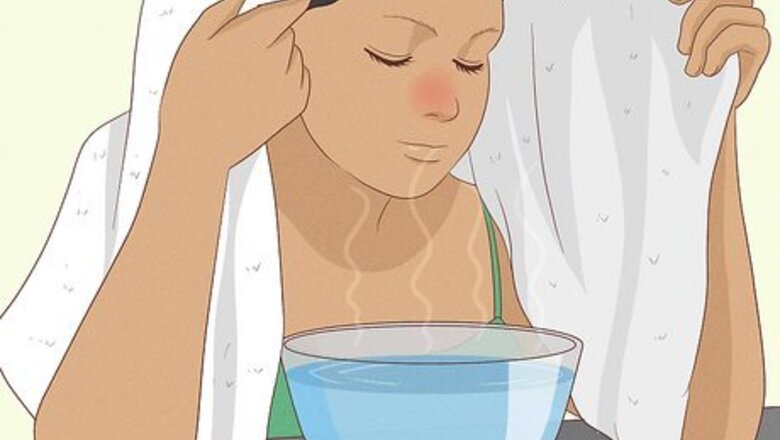
views
Use steam therapy to recover from a cold.
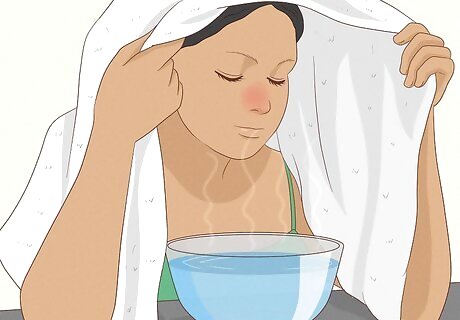
Steam can help soothe sore throats and nasal congestion. To inhale steam, fill up a bowl with hot water and drape a towel over your head. Breathe the steam in through your nose and mouth until the water cools down and isn’t steamy anymore. You can do this multiple times per day until you’re feeling better. If you don’t want to stand over a bowl, head to the bathroom and turn your shower on using hot water. Shut the bathroom door and inhale the steam as it fills the room.
Gargle with saltwater for sore throats and congestion.
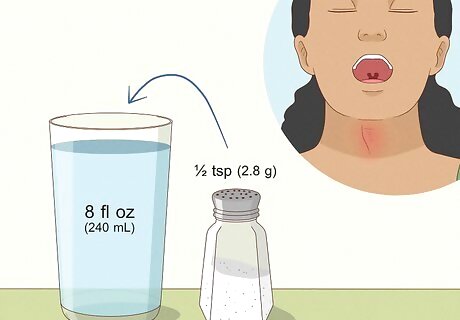
Soothe a sore or scratchy throat with this simple remedy. To make an effective saltwater rinse, mix about 1/2 tsp (2.8 g) of salt in an 8 fl oz (240 mL) glass of warm water. Gargle, rinse, and repeat as necessary. This method is not as effective for children younger than 5 years old. Often, they are too young to know how to properly gargle.
Flush out your sinuses for a stuffy nose.
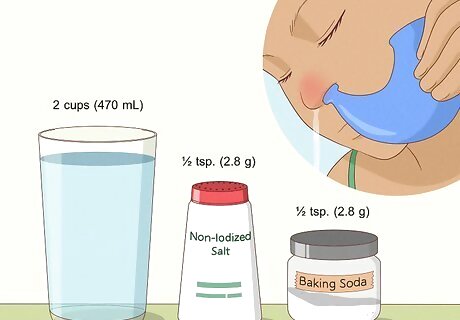
Mucus buildup can be painful, and it can even lead to infections. If you’re dealing with a ton of congestion, stir 1/2 tsp (2.8 g) of non-iodized salt and 1/2 tsp (2.8 g) of baking soda into 2 cups (470 mL) of lukewarm distilled or previously boiled water. Fill a small bulb syringe or a neti pot with the water mixture, then insert the tip into one nostril and lean over a sink. Gently squeeze the bulb or tilt the neti pot into your nostril and let the water stream out your other nostril. Repeat this on the other side. Always use distilled water or water you’ve boiled at home. Using straight tap water can introduce bacteria into your sinuses, and that can lead to an infection. If you're not comfortable flushing your sinuses, you can also try using over-the-counter saline sprays. These products are simply squirted into the nostrils to soothe irritation and relieve stuffiness.
Take over-the-counter medicine for allergies and cold symptoms.
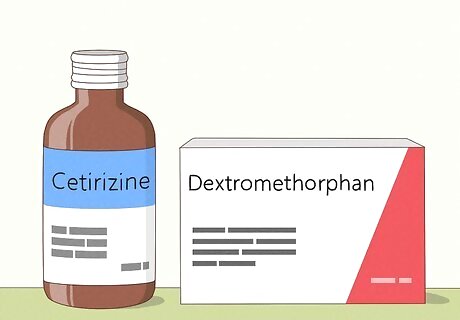
Medicine can’t cure you, but it can relieve your symptoms. Antihistamines like cetirizine, fexofenadine, and loratadine help reduce the body's response to allergens and can reduce runny noses and sinus congestion. Cough medicine like dextromethorphan can help suppress your need to cough and help you sleep at night. Decongestants can help reduce congestion and open up nasal passages. Pain relievers and fever reducers can help treat body aches, headaches, and fevers. Common antihistamines include Zyrtec, Allegra, and Claritin. Popular cough medicines include Triaminic Cold and Cough and Robitussin Cough. Decongestants like Afrin and Sudafed are available at most drugstores. Common pain relievers include aspirin, acetaminophen, and ibuprofen. Note that aspirin should never be given to children or teenagers, as it has been linked to a serious and potentially fatal condition called Reye's syndrome.
Stay hydrated to help against colds and other viruses.
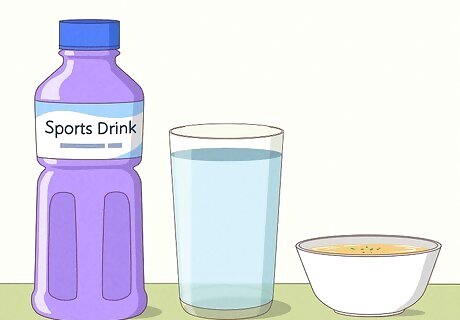
It will help clear congestion and prevent dehydration. Water is the best beverage for staying hydrated, but juice, sports drinks, tea, and broth can all help, too. Even if you don’t have a huge appetite, try to sip on something throughout the day to give your body the fluids it needs. Hot beverages like tea can help relieve a sore throat and sinus problems, including runny nose, sneezing, and coughing. Adding honey may help further soothe a sore throat. Diluted sports drinks (mix one part water with one part sports drink) and electrolyte solutions can replenish essential minerals that may be lost through vomiting, sweating, or diarrhea. Avoid alcohol, coffee, and soda, as those liquids can dehydrate you further.
Do the BRAT diet for an upset stomach.
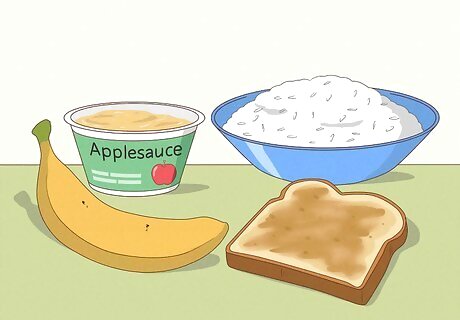
If you have an upset stomach, this can help you recover quickly. BRAT stands for bananas, rice, applesauce, and plain toast. If you’ve been throwing up or having diarrhea, try to eat these plain foods to settle your stomach until you feel better. Foods like these won’t overwhelm your stomach, so they shouldn’t make your sickness any worse.
Try chicken noodle soup for cold, sinus infection, or sore throat.
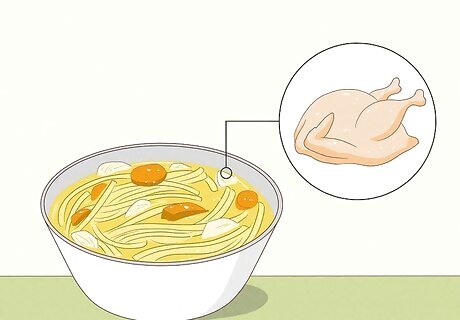
There’s a reason so many people recommend it when you’re sick. Chicken noodle soup contains chicken broth, which is great for hydrating and replenishing nutrients. It contains proteins, vitamins, and electrolytes, all of which will help you get better faster. Heat up a bowl of soup and slurp it slowly when you’re feeling under the weather. Chicken noodle soup is a classic, but most types of soup will give you the same benefits.
Eat a balanced diet.

Fruits, veggies, and protein will help you recover faster. If you have an appetite, try to stay away from processed foods and sugar, which won’t help you much in terms of feeling better. Instead, gravitate toward leafy greens, fresh produce, and lean protein, like chicken or turkey. It’s normal to have a decreased appetite when you’re sick. However, try to eat a little something every day if you can.
Get enough sleep to support your immune system.

Give yourself time to sleep in as you recover from your illness. Most adults need between 7 and 9 hours of sleep per night, but when you’re sick, you might need even more. Try to limit your obligations in the morning and give yourself enough time to sleep in every day. Getting enough sleep while you’re sick isn’t always easy. If your symptoms are keeping you awake at night, try taking an over-the-counter medication about 30 minutes before you go to sleep. Don’t be afraid to take naps, too! You’re going to be more sleepy than usual, so going to bed in the middle of the day is just fine. If you’re dealing with a sore throat, put a humidifier in your room to add moisture to the air and help alleviate your symptoms so you can sleep.
Keep a positive attitude.
Maintain a good outlook on life to keep yourself healthy. Some studies have shown that when you have a positive attitude about feeling better, it can actually improve how you’re feeling. Spend your time doing things that you enjoy, try to have some fun, and think about healing and good thoughts. Make some short-term goals and reward yourself once you complete them to help you stay emotionally healthy and active.
Ask for help from others.

Don’t try to do everything yourself when you’re sick. If you aren’t feeling well and you’d like a warm drink, ask a member of your household to get it for you. The more you can lie back and relax, the faster you’ll rest up and recover from your illness. If you don’t live with anyone, reach out to friends or family members and have them bring you snacks and medication if you need it. You can also order food or groceries for delivery if you aren’t up to leaving the house.
Try taking supplements.
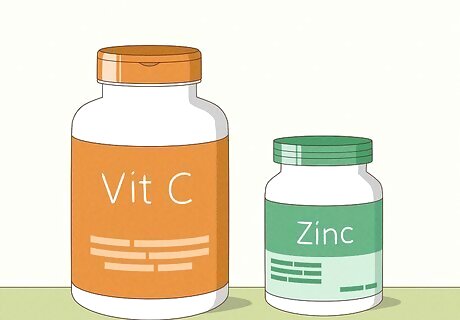
While taking vitamin supplements won’t cure you, they might help. Some experts recommend vitamin C and zinc to help strengthen the immune system, but studies suggest that vitamin C must be taken consistently (not just at the beginning of an illness) to effectively strengthen the immune system. If you choose to take zinc supplements, don’t take more than 50 mg per day to prevent adverse side effects. You can find supplements at most health stores. Always read the dosage instructions on the label, and don’t take more than is recommended. If you aren’t sure whether or not you should take supplements, talk to your doctor.
Experiment with herbs.
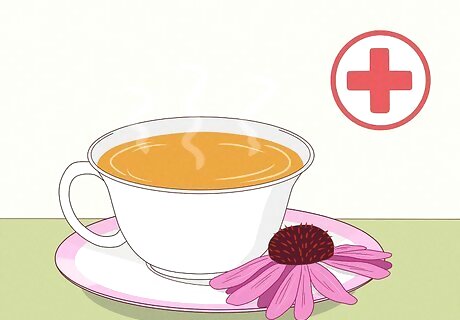
Some studies suggest that herbs may reduce your symptoms. However, these products are not tested by regulatory bodies like the Food and Drug Administration (FDA). In addition, some herbs can cause side effects, especially when taken with other medications or supplements (this is known as the drug-herb interaction). If you’d like to use herbs to alleviate your symptoms, talk to your doctor about what you should use and how much to take at one time. Common herbal remedies include: Echinacea (usually made into a tea): may help relieve cold and flu symptoms if taken early on. Elderberry: may reduce congestion and promote sweating. Eucalyptus: helps relieve coughs and cold symptoms. Commonly found in over-the-counter lozenges and cough syrups. Peppermint: reduces congestion and soothes upset stomach. Peppermint should not be used with infants.
Avoid smoking.
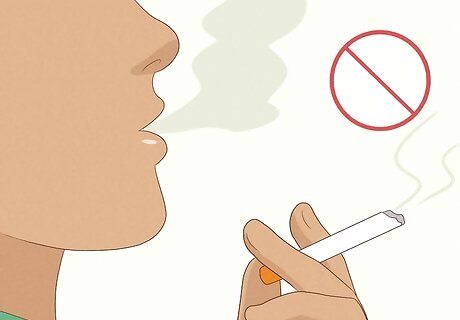
Smoke can irritate your airways and make your symptoms worse. As you recover from your illness, stay away from smoking anything until you feel better. If you live with any smokers, ask them to take it outside for the time being. Smoking can also make you cough more, which is bad for your throat and your airway.

















Comments
0 comment